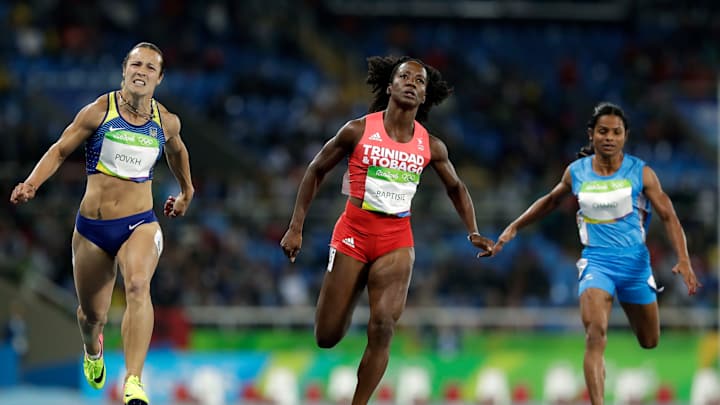Brief glimpse of Olympics, but all worth it for Dutee Chand

RIO DE JANEIRO (AP) Dutee Chand pulled out all the stops to run at the Olympics, even taking the international track federation to court in her bid to get to Rio de Janeiro.
She won that legal battle and, ultimately, it got her just 11.69 seconds of competition in heat five of the 100 meters on Friday.
Chand said it was worth every tiny moment at the Olympic Stadium.
Chand's victory at sport's highest court last year forced the IAAF to temporarily shelve the hyperandrogenism rules that enforced a limit on female athletes' naturally occurring testosterone levels and affected Chand, South African 800-meter runner Caster Semenya and others.
''It wasn't an easy journey to participating in the Olympics. It has taken me 14 years of training and hard work,'' Chand said in an interview with The Associated Press as she prepared for her Olympic debut. ''My efforts have been rewarded.''
Chand had wanted to be a runner from the age of six.
After Friday's race, where she finished seventh in her heat to be eliminated, she hung around for the world's media, smiling shyly while answering questions.
Her story, much like Semenya's, involves a highly contentious issue.
Hyperandrogenism causes some women with intersex conditions to produce much higher levels of testosterone than normal. In 2011, the IAAF decided to force those athletes to lower their levels artificially to be eligible to compete, believing the testosterone gave them an unfair advantage.
For the 20-year-old Chand, it led to turmoil in her young career.
Having won a bronze medal in the 200 meters at the 2013 Asian championships, she was dropped from India's Commonwealth Games team the following year after undergoing gender verification tests, and later ruled ineligible to compete.
Chand, who was just a teenager when she learned of her condition, decided to challenge the IAAF on that, claiming it was unfair to regulate a naturally occurring condition.
''(It) helped me in winning support all around,'' she said of her case, which lifted the lid on the IAAF's rules and on a largely misunderstood condition.
After winning that fight at the Court of Arbitration for Sport last year, Chand couldn't win another competitive tussle on the track at the Olympic Stadium. But already, minutes after running in Rio, she was talking about the 2020 Olympics in Tokyo.
---
Associated Press writers Ashok Sharma in New Delhi and John Leicester in Rio de Janeiro contributed to this report.
